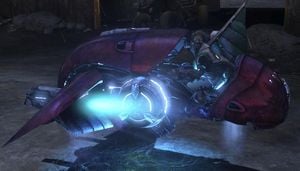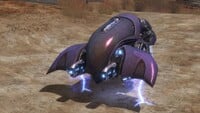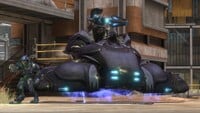Boosted gravity propulsion drive: Difference between revisions
From Halopedia, the Halo wiki
BaconShelf (talk | contribs) No edit summary |
BaconShelf (talk | contribs) mNo edit summary |
||
| (3 intermediate revisions by the same user not shown) | |||
| Line 5: | Line 5: | ||
==Overview== | ==Overview== | ||
===Operation=== | ===Operation=== | ||
Boosted gravity propulsion drives are used to provide the characteristic hover-field that enables the locomotion of Covenant terrestrial craft. They are used by most Covenant craft functioning within reasonably normal gravity wells, though are superseded by impulse drive where exoatmospheric usage is required. As their name suggests, they employ [[anti-gravity technology]] to suspend the vehicle a short distance off the ground in a stable position and propel them at significant speed in a given direction.{{Ref/Reuse|Enc22}} The process by which this is achieved was described by the Forerunner entity [[Catalog]] as ''"inefficient [cyclic gravity] plates with short-range [effector fields]''", and was considered by Catalog to be a rudimentary step toward implementation of full [[torsion plate]] technology, as used by [[Forerunner starship]]s. Catalog's wording also indicates that boosted gravity propulsion drives operate on a similar principle to the much larger [[repulsor engine]]s used by [[Covenant starship]]s.{{Ref/Site|URL=https://forums.halowaypoint.com/yaf_postsm2969311_Catalog-Interaction.aspx|Site=Halo Waypoint Forums|Page=Catalog Interaction|D=13|M=10|Y=2014|LocalArchive=Catalog/Archive/2014#Reality of Halo: Plasma|Quote=All UNSC and Covenant vessels make extensive use of [repulsors-lifters] inside of gravity well [lattices], which can be operated in a [traction caterpillar] mode to generate limited amounts of [pseudothrust]. Inefficient [cylic gravity] plates with short-range [effector fields] are also utilized by Covenant ground vehicles. This is a rudimentary technology [bridge] to refined application of [twist-torsion] impulse plates for [high-thrust] travel usable outside of the supporting [lattice] of a planet's gravity well.}} The | Boosted gravity propulsion drives are used to provide the characteristic hover-field that enables the locomotion of Covenant terrestrial craft. They are used by most Covenant craft functioning within reasonably normal gravity wells, though are superseded by impulse drive where exoatmospheric usage is required. As their name suggests, they employ [[anti-gravity technology]] to suspend the vehicle a short distance off the ground in a stable position and propel them at significant speed in a given direction.{{Ref/Reuse|Enc22}} The process by which this is achieved was described by the Forerunner entity [[Catalog]] as ''"inefficient [cyclic gravity] plates with short-range [effector fields]''", and was considered by Catalog to be a rudimentary step toward implementation of full [[torsion plate]] technology, as used by [[Forerunner starship]]s. Catalog's wording also indicates that boosted gravity propulsion drives operate on a similar principle to the much larger [[repulsor engine]]s used by [[Covenant starship]]s.{{Ref/Site|URL=https://forums.halowaypoint.com/yaf_postsm2969311_Catalog-Interaction.aspx|Site=Halo Waypoint Forums|Page=Catalog Interaction|D=13|M=10|Y=2014|LocalArchive=Catalog/Archive/2014#Reality of Halo: Plasma|Quote=All UNSC and Covenant vessels make extensive use of [repulsors-lifters] inside of gravity well [lattices], which can be operated in a [traction caterpillar] mode to generate limited amounts of [pseudothrust]. Inefficient [cylic gravity] plates with short-range [effector fields] are also utilized by Covenant ground vehicles. This is a rudimentary technology [bridge] to refined application of [twist-torsion] impulse plates for [high-thrust] travel usable outside of the supporting [lattice] of a planet's gravity well.}} The propulsion systems of Covenant [[Ghost]]s have also been described as twin sets of reactionless [[impulse drive]]s; it is unclear to what degree the two technologies crossover, though it may indicate that impulse drives are used to propel the vehicle's movement while the boosted gravity drive keeps the vehicle hovering above the ground.{{Ref/Game|Halo Legendary Crate|Halo Legendary Crate/Data Drops|Data Drop 17|Detail=Ghost}} | ||
Vehicles using boosted gravity propulsion exhibit four axis' of movement, and are usually capable of moving left-to-right alongside forward and back, albeit at a slower rate. While active, the drive emits a notable blue glow emanating from the vehicle's undercarriage, accompanied by the sporadic emittance of glowing particles and electrical arcs. Even when used on heavy vehicles such as the [[Wraith]] series of tanks, boosted gravity propulsion drives are capable of surprising bursts of speed and agile mobility.{{Ref/Site|URL=https://www.halowaypoint.com/en-us/universe/vehicles/wraith|Site=Halo Waypoint|Page=Wraith|D=12|M=07|Y=2021}} Boosted gravity vehicles are generally additionally capable of a secondary limited-time boost which can massively increase the vehicle's speed - which can be used for rapid maneuvers or evading fire. | Vehicles using boosted gravity propulsion exhibit four axis' of movement, and are usually capable of moving left-to-right alongside forward and back, albeit at a slower rate. While active, the drive emits a notable blue glow emanating from the vehicle's undercarriage, accompanied by the sporadic emittance of glowing particles and electrical arcs. Even when used on heavy vehicles such as the [[Wraith]] series of tanks, boosted gravity propulsion drives are capable of surprising bursts of speed and agile mobility.{{Ref/Site|URL=https://www.halowaypoint.com/en-us/universe/vehicles/wraith|Site=Halo Waypoint|Page=Wraith|D=12|M=07|Y=2021}} Boosted gravity vehicles are generally additionally capable of a secondary limited-time boost which can massively increase the vehicle's speed - which can be used for rapid maneuvers or evading fire. | ||
| Line 25: | Line 25: | ||
==Gallery== | ==Gallery== | ||
<gallery> | <gallery> | ||
File: | File:HR Beta Boneyard Ghost Screenshot.jpg|A Ghost with an active propulsion drive. | ||
File: | File:HR Beta Boneyard Wraith Screenshot.jpg|The {{Pattern|Zurdo|Wraith}} with its propulsion drive, note that due to its weight the vehicle is unable to hover higher. | ||
</gallery> | </gallery> | ||
== Sources == | ==Sources== | ||
{{Ref/Sources}} | {{Ref/Sources}} | ||
[[Category:Covenant technology]] | [[Category:Covenant technology]] | ||
[[Category:Gravity technology]] | [[Category:Gravity technology]] | ||
[[Category:Propulsion]] | [[Category:Propulsion]] | ||
Latest revision as of 04:37, October 4, 2024

Boosted gravity propulsion drives are a kind of gravitic transport drive used by most terrestrial vehicles of the Covenant. They were developed by the Sangheili prior to the War of Beginnings, though alongside other systems such as impulse drives were massively improved during the Covenant era based on the recovery and analysis of Forerunner technology.[1]
Overview[edit]
Operation[edit]
Boosted gravity propulsion drives are used to provide the characteristic hover-field that enables the locomotion of Covenant terrestrial craft. They are used by most Covenant craft functioning within reasonably normal gravity wells, though are superseded by impulse drive where exoatmospheric usage is required. As their name suggests, they employ anti-gravity technology to suspend the vehicle a short distance off the ground in a stable position and propel them at significant speed in a given direction.[1] The process by which this is achieved was described by the Forerunner entity Catalog as "inefficient [cyclic gravity] plates with short-range [effector fields]", and was considered by Catalog to be a rudimentary step toward implementation of full torsion plate technology, as used by Forerunner starships. Catalog's wording also indicates that boosted gravity propulsion drives operate on a similar principle to the much larger repulsor engines used by Covenant starships.[2] The propulsion systems of Covenant Ghosts have also been described as twin sets of reactionless impulse drives; it is unclear to what degree the two technologies crossover, though it may indicate that impulse drives are used to propel the vehicle's movement while the boosted gravity drive keeps the vehicle hovering above the ground.[3]
Vehicles using boosted gravity propulsion exhibit four axis' of movement, and are usually capable of moving left-to-right alongside forward and back, albeit at a slower rate. While active, the drive emits a notable blue glow emanating from the vehicle's undercarriage, accompanied by the sporadic emittance of glowing particles and electrical arcs. Even when used on heavy vehicles such as the Wraith series of tanks, boosted gravity propulsion drives are capable of surprising bursts of speed and agile mobility.[4] Boosted gravity vehicles are generally additionally capable of a secondary limited-time boost which can massively increase the vehicle's speed - which can be used for rapid maneuvers or evading fire.
Unlike walkers, wheeled and tracked vehicles such as those developed by humanity or the Jiralhanae, boosted gravity vehicles suffer in areas of dense foliage. Vehicles operating in such terrain are easily slowed to a crawl - a key weakness which was exploited by United Nations Space Command Gauss Warthog tank-hunters during the Human-Covenant War.[5] The systems have some difficulty in managing the vehicle on rugged and uneven terrain - the pilot must take this into account as uneven or broken terrain causes the vehicle to dip and rise in accordance with the environment. This can prohibit movement especially for larger vehicles, in regions which a more rugged counterpart such as a Scorpion tank may have little issue.
Development history[edit]
Early boosted-gravity propulsion systems were developed by the Sangheili well before the War of Beginnings. Following the establishment of the Covenant empire, boosted gravity systems were improved over the millennia thanks to the recovery and reverse-engineering of Forerunner machines.[1] In the lead-up to the Great Schism, many Jiralhanae vehicles such as the Qavardu Workshop Prowler were augmented with boosted gravity drives.[6]
Usage[edit]
Boosted gravity propulsion drives are used on most terrestrial ground and air vehicles of the Covenant and its remnants. This includes, though is not limited to, the following:
- Banshees[7][8][9]
- Ghosts[7][8][10]
- Jiralhanae War-sleds such as the Qavardu Workshop Prowler[6]
- Shadows[7][8]
- Spectres[7][8][11]
- Wraiths[7][8][12]
Gallery[edit]
The Zurdo-pattern Wraith with its propulsion drive, note that due to its weight the vehicle is unable to hover higher.
Sources[edit]
- ^ a b c Halo Encyclopedia (2022 edition), page 218
- ^ Halo Waypoint Forums, Catalog Interaction: "All UNSC and Covenant vessels make extensive use of [repulsors-lifters] inside of gravity well [lattices], which can be operated in a [traction caterpillar] mode to generate limited amounts of [pseudothrust]. Inefficient [cylic gravity] plates with short-range [effector fields] are also utilized by Covenant ground vehicles. This is a rudimentary technology [bridge] to refined application of [twist-torsion] impulse plates for [high-thrust] travel usable outside of the supporting [lattice] of a planet's gravity well." (Retrieved on Oct 13, 2014) [local archive] [external archive]
- ^ Halo Legendary Crate, Data Drop 17: Ghost
- ^ Halo Waypoint, Wraith (Retrieved on Jul 12, 2021) [archive]
- ^ Halo 5: Guardians, REQ card: Woodland Gauss Warthog Description "In rugged terrain the Gauss Warthog is a deadly tank hunter, easily picking off Covenant boosted-gravity vehicles slowed to a crawl in dense foliage. Improved Gauss Warthog with extra armor."
- ^ a b Halo Encyclopedia (2022 edition), page 273
- ^ a b c d e Halo 2 manual, page 18-19
- ^ a b c d e Halo 2 Limited Collector's Edition manual, page 16-17
- ^ Halo 3 marketing, Believe campaign, Diorama: Vehicle: Banshee
- ^ Halo Encyclopedia (2022 edition), page 464
- ^ Halo Encyclopedia (2022 edition), page 272
- ^ Halo Encyclopedia (2022 edition), page 274

